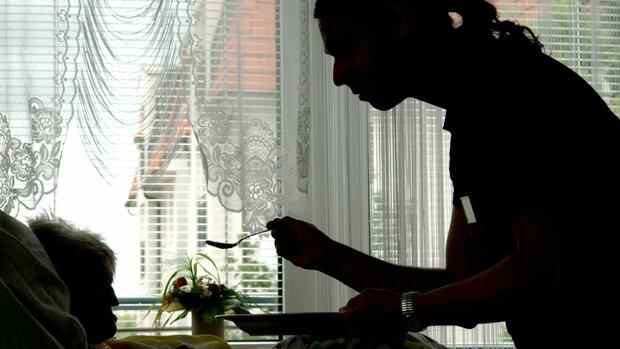The “working class” group is united by the bitter realization that their work will not carry them through life.
(Photo: dpa)
Dusseldorf Deliver parcels in piecework, especially many before Christmas or in lockdown. Drag each other’s organic yoghurt jars over the scanner, wash and feed the elderly. Cleaning, cooking, telephoning, building walls, hauling. And please be very friendly, the potential replacement is already on the company’s hold.
Julia Friedrichs, who followed the traces of the powerful and the rich in “Gestatten: Elite”, has now looked around at the other end of society. Not at the bottom, but with those who “work hard and obey the rules,” as Bill Clinton once put it. For those whose hard work is so badly rewarded that even an overfull hourly account is not enough to make a living. Cashier and violin teacher, garbage collector and geriatric nurse.
Friedrichs calls them the “working class”, the English term was chosen deliberately. This shift of workers hardly includes malochers in the mine or doers in assembly suits, but rather those who provide services of all kinds.
But this also indicates a shortcoming of this growing group: They may be united by the bitter realization that their work does not carry them through life. But their activities are so different that they don’t see themselves as a class, that they don’t show solidarity.
Top jobs of the day
Find the best jobs now and
be notified by email.
The second problem: “While the heart of the working class is weakening, that of the capital side is pumping faster and faster,” writes Friedrichs. She has read all the studies that she has come across on the subject, interviewed economists and experts and stated: “Work has lost. Capital gained. “

Julia Friedrichs: Working Class. Why we need work that we can live on.
Berlin publishing house
Berlin 2021
317 pages
22 euros
ISBN: 978-3-8270-1426-9
Then she set out to check the numbers against reality. The multiple award-winning reporter drove to the people’s home and gathered together the cracks that are opening up in society.
These individual stories make “Working Class”, the book, extremely valuable. And despite all the differences, it becomes clear that the disloyalty of society, the tax system and the world of work towards these people is similar.
There is, for example, Sait, who has been cleaning Berlin subway stations from rubbish and vomit for 18 years. He calculates that an hourly wage of twelve or 13 euros would be enough for him and his family to lead a life in dignity. But Sait only receives 10.56 euros, 1600 euros gross per month. And so his case stands for the end of a pact of earlier times: that arduous, not particularly satisfying work is rewarded with a middle class income.
There are the Karstadt employees who embarked on a life with a company whose name is now finally disappearing. There is Christian, who worked for a company for 15 years and thought his office environment was a family. At some point the pace of work picked up and the pressure increased; Christian was demoted, bullied and literally crashed.
Another protagonist is Alexandra, a musician with top marks who teaches children to play the piano at every possible minute but hardly sees her own. She once helped a family search the house for hidden banknotes, in the end there were so many that there was enough for a new car. She looked in vain for reserves when the clarinet of her own talented son needed a repair. One can only imagine the abyss that opens up when lessons are canceled in the pandemic and parents terminate contracts.
The “new normal” is as humble as the old one
Subtle and kitsch-free, Friedrichs tells of those who have no reserves, no inheritance and no return on investment, for whom good advice is expensive when they have to pay an unexpected bill of 1000 euros. Every third person in Germany cannot do that, and every tenth person is over-indebted.
The reporter’s happiness is the misfortune of her protagonists, whom she first met in 2019 – and which Corona then hit with full force. There is no happy ending: while share prices have long since recovered, the “new normal” for members of the “working class” is just as modest as the old one.
Friedrich’s conclusion: only a policy that finally touches wealth and gradually increases the return on labor can straighten out the disparity that is tearing society apart.
More: Sahra Wagenknecht: “The really rich have also won through Corona”
